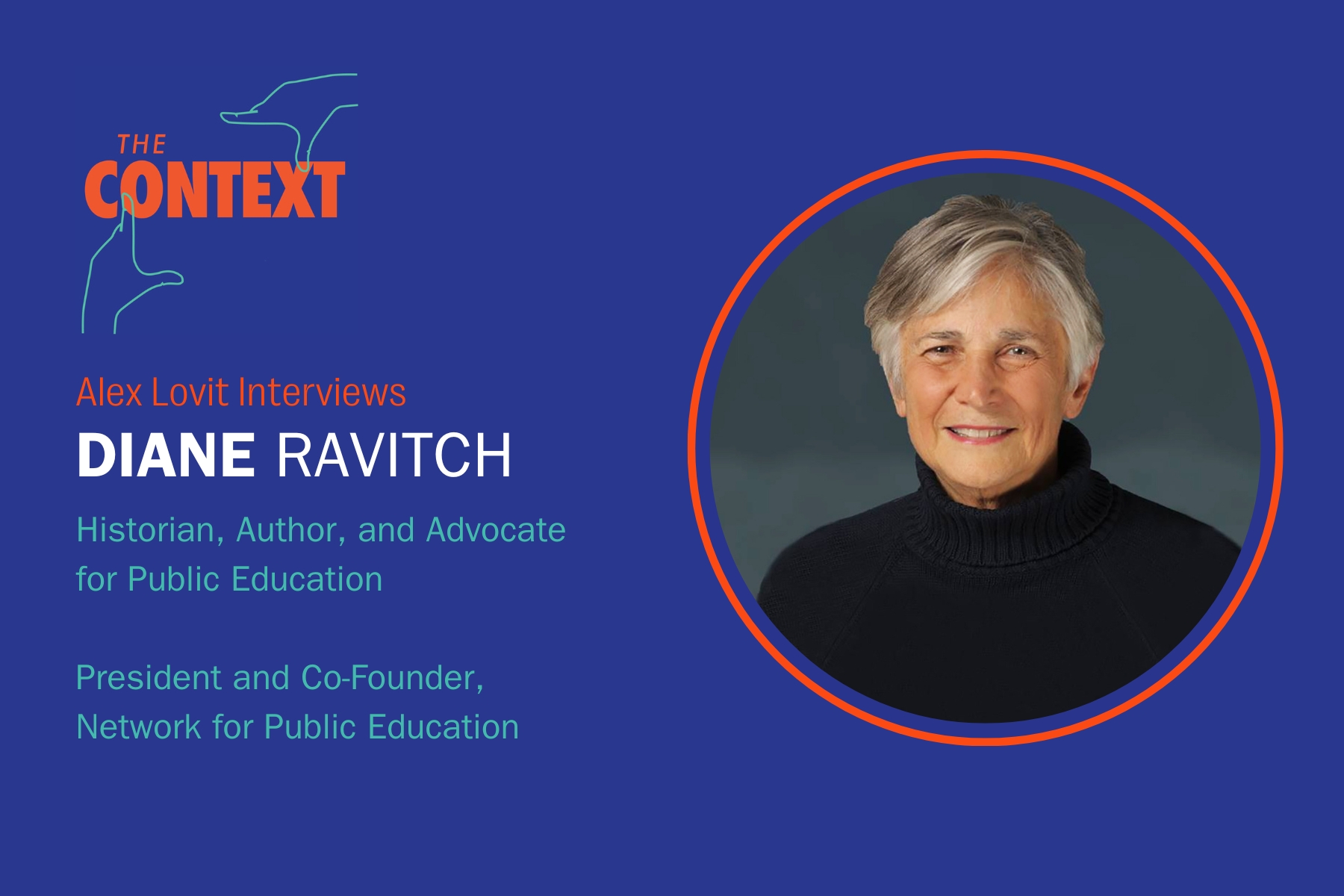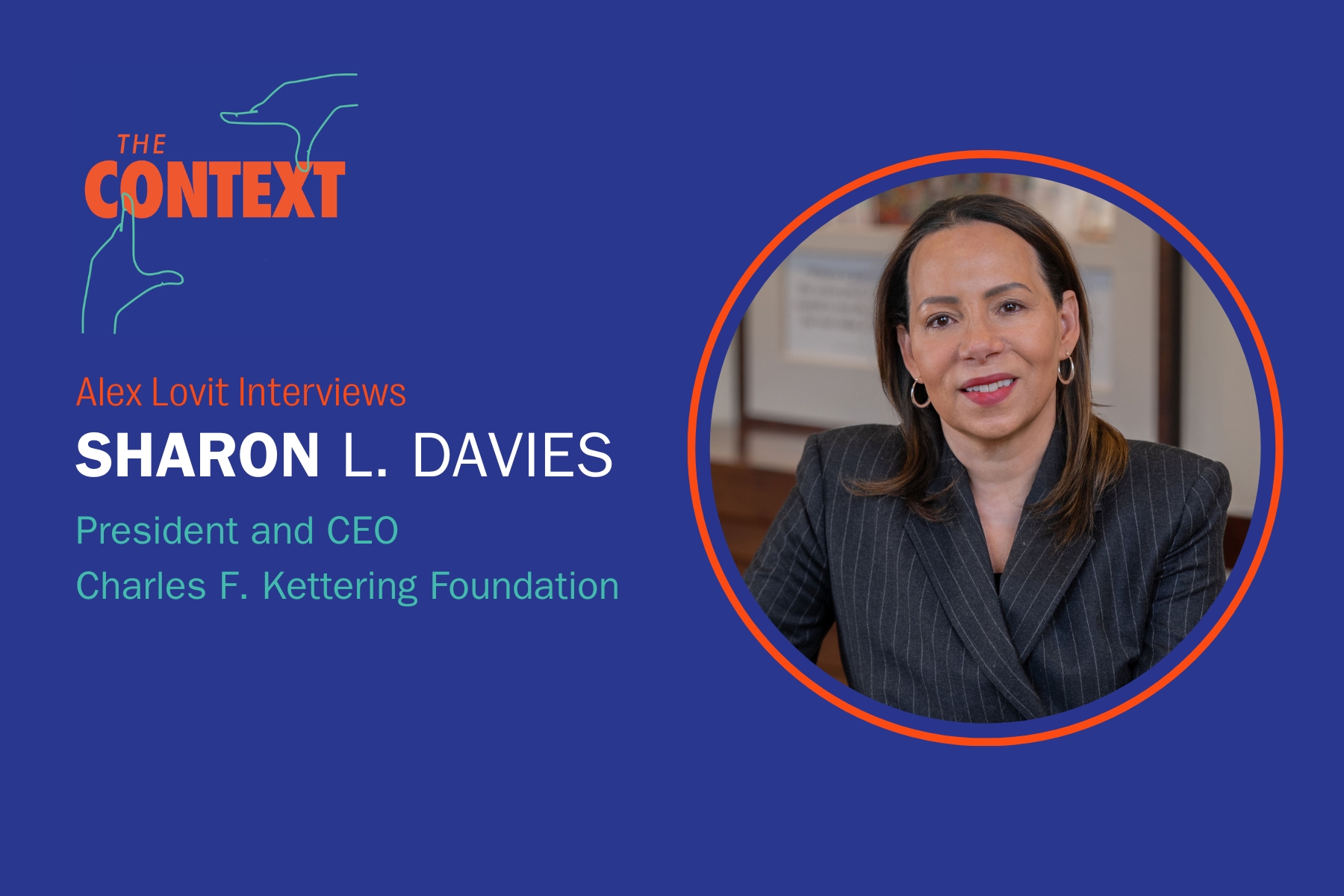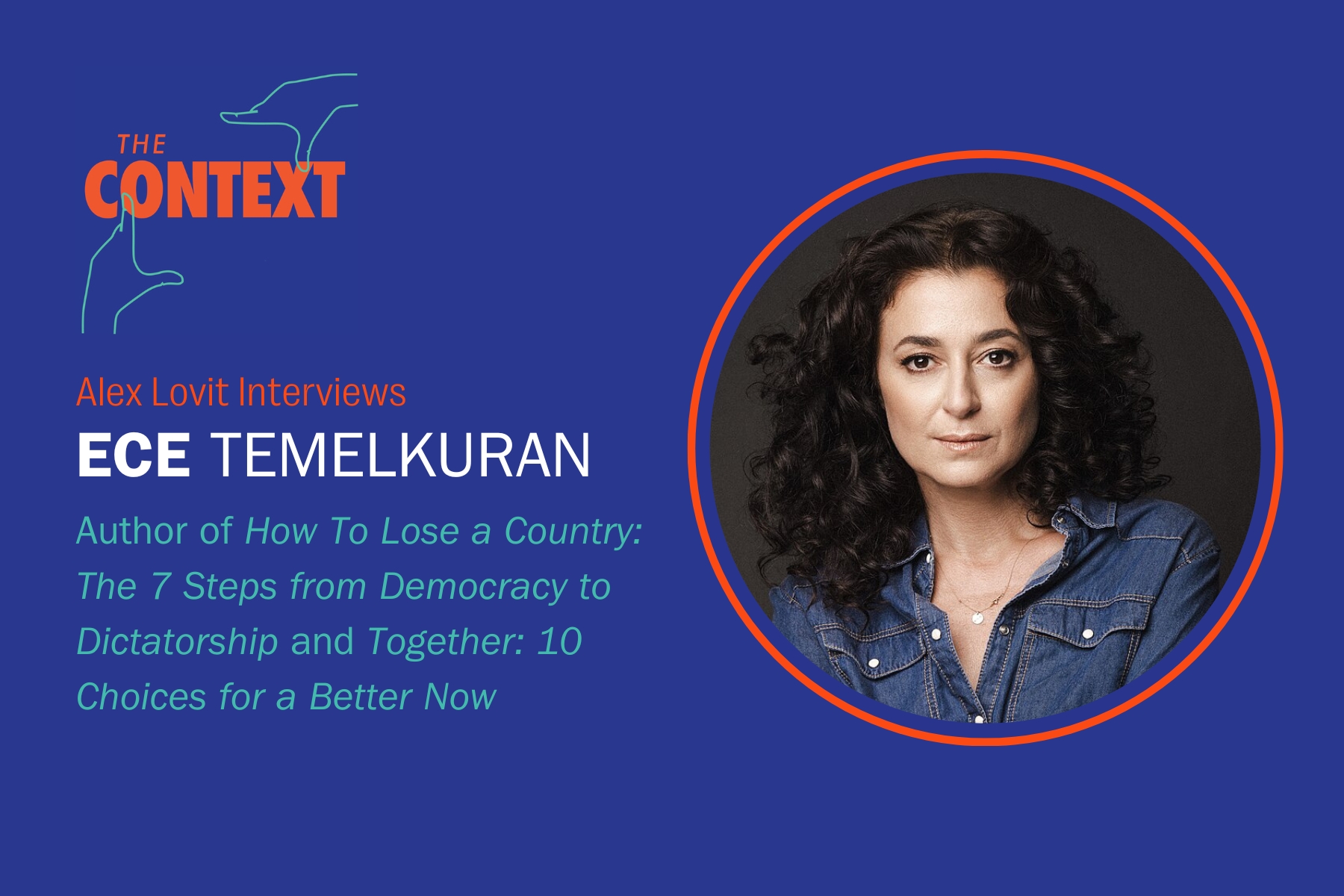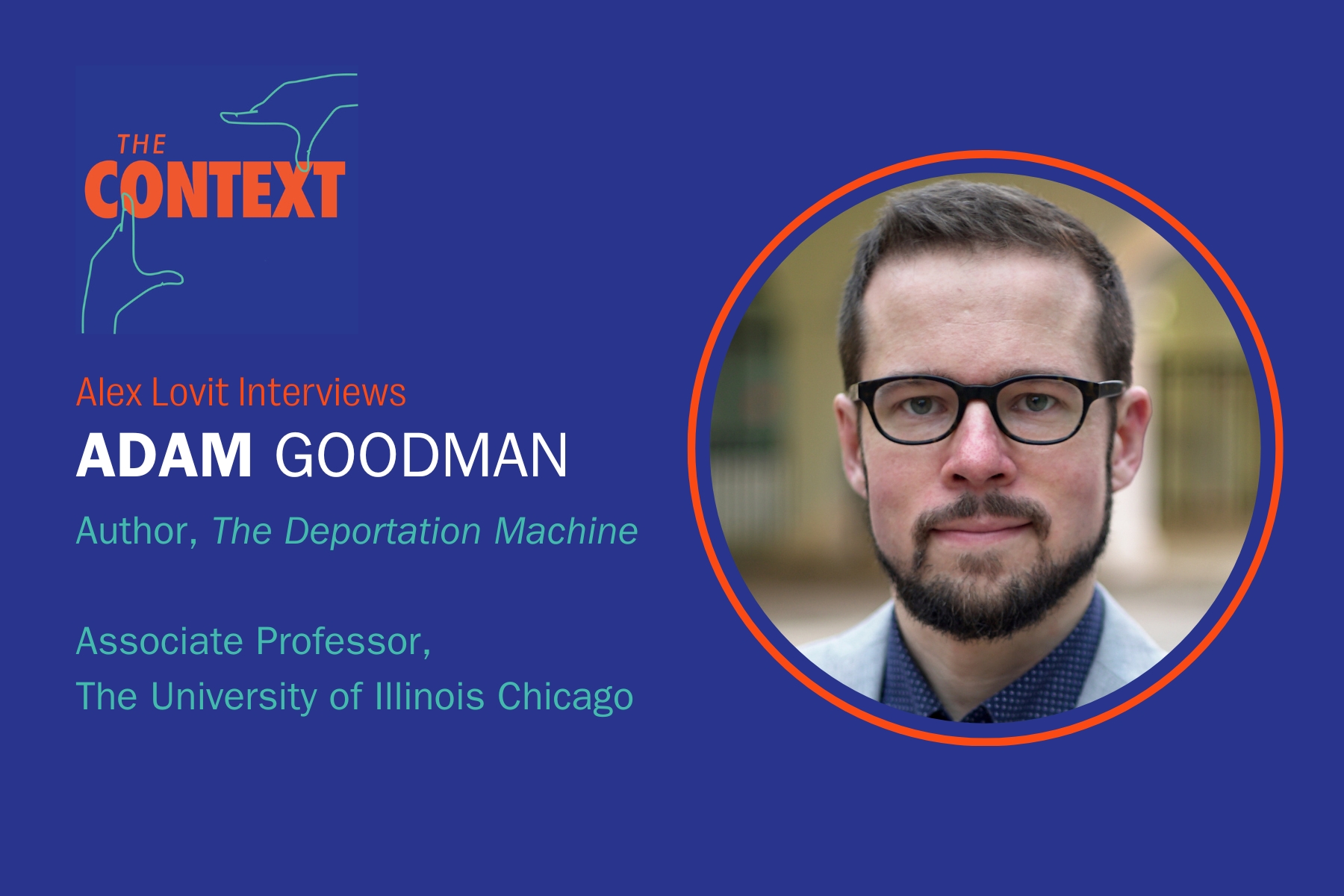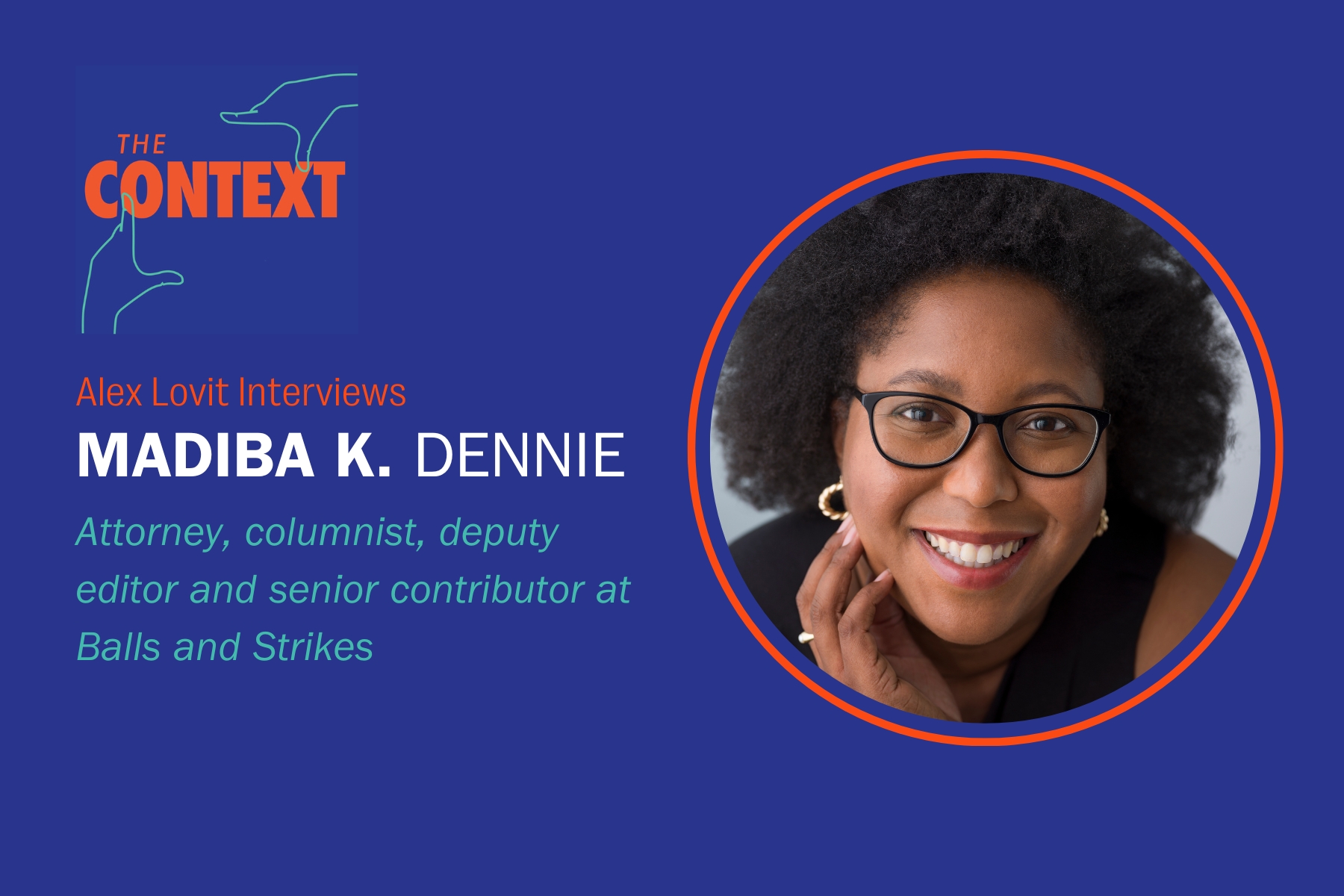
Sarah Longwell: The Republican Party Has Abandoned Its Principles
Episode Summary
How did one of our major political parties abandon its principles? And what do voters make of that shift?
Host Alex Lovit is joined by Sarah Longwell—a political strategist who broke from the Republican party when it acquiesced to Trump’s authoritarian tendencies. She went on to cofound a media outlet (The Bulwark) and an advocacy organization (Defending Democracy Together) to advance pro-conservative causes. She’s also the host of The Focus Group podcast and a senior fellow at the Charles F. Kettering Foundation.
This episode is part one of a two-part conversation. Come back next week for part two.
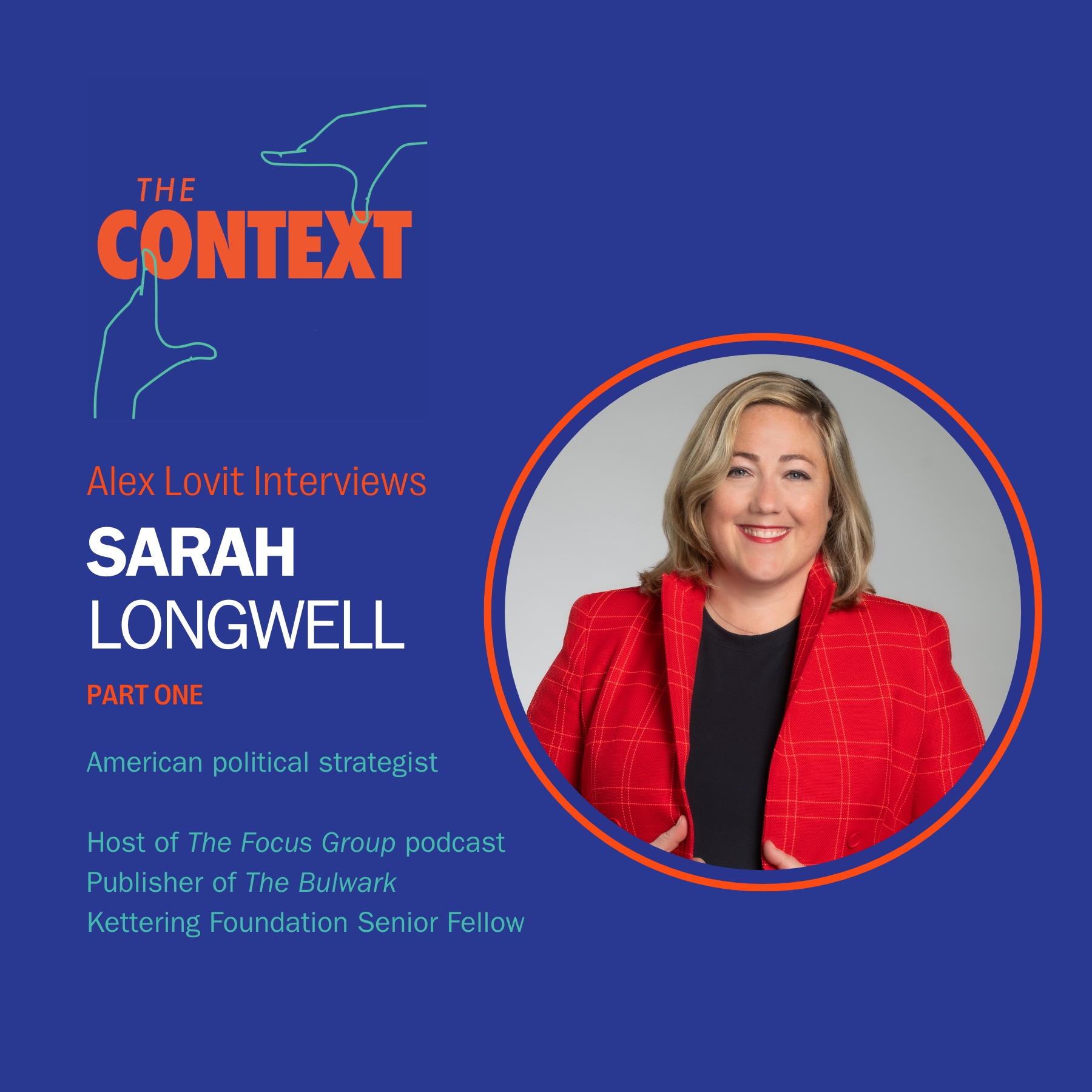
38:53
The Context is a production of the Charles F. Kettering Foundation.
Our producers are George Drake, Jr. and Emily Vaughn.
Melinda Gilmore is our director of communications.
The rest of our team includes:
Show Links
Sarah Longwell: The Republican party became a cult of personality, which means that, when Donald Trump says, “Now, I’m going to go violate the law,” there is no longer any principles at play. It’s just about fidelity to this guy. Republicans now value that over all of the principles that used to make America what it was.
Alex Lovit: Any way you tell the story of the last decade of American politics, the central figure is Donald Trump. Trump has forced the Democratic party to redefine itself in opposition to him. And he’s divorced the Republican party from much of what it used to stand for.
That’s left many conservative voters in America without a political home, which is a problem for democracy. We need a robust variety of viewpoints in the mix. So what does the future hold for conservative voters in America? Will they join forces with the left to form a pro-democracy coalition?
You are listening to The Context, a podcast from the Charles F. Kettering Foundation about how to get democracy to work for everyone and why that’s so hard to do. I’m your host, Alex Lovit.
My guest today is Sarah Longwell. She’s a leading conservative voice in multiple arenas. Sarah is cofounder and publisher of the Bulwark, a conservative news and opinion website. She’s also a podcaster. She hosts The Focus Group podcast, which you should check out if you’re not already a listener.
She’s the cofounder and executive director of Defending Democracy Together. And she’s a senior fellow here at the Kettering Foundation. For the first part of her career, Sarah was a political strategist working to influence and elect Republican politicians.
But as Trump remade her party and made converts of her compatriots, Sarah was worried about democracy. In this conversation, she’ll talk about why and how she’s continued to fight for American democracy even when it meant breaking with many of her former colleagues.
One last thing before we get to the interview—Sarah had more insights than we could fit into one episode. So this interview is in two parts. In this first part, you’ll hear Sarah’s story about what’s happened to the Republican party in recent years and her own journey from insider to critique.
Make sure to come back next week for more of Sarah’s insights into how to get Americans to recommit to democracy. Sarah Longwell, welcome to The Context.
Sarah Longwell: Hey, thanks for having me.
Alex Lovit: Democracy was a founding principle in this country, free speech, representative government, equal treatment under the law. How do you explain why those values have come under attack 250 years into the American story?
Sarah Longwell: Well, it’s not the first time they’ve been under attack. I mean, I do think we get a little myopic in this moment and think, man, we’ve never been here before, which doesn’t mean it’s not an emergency. I do think we are in an emergency right now.
I actually think we’ve been underreacting to the level of threat to democracy that Trump and Trumpism is an expression of. But I also think, you know, we had a whole war [laughs] that was America fighting other Americans.
We had an era where the Ku Klux Klan ran everything informally. But they were judges. And they were the cops. And we had the institution of slavery. So like let’s not over-estimate our particular moment in history as like the whole lynchpin.
Throughout human history, not just American history, there have been these disruptive times. So take for—like the printing press—before the printing press, right, if you lived on one side of a hill and you were like, “Okay. Well, we all believe this thing. And we exist peacefully.”
And then, you were like, “The printing press shows me that, on the other side of the hill, there’s people who believe this insane thing. We should probably go kill them.” So yes. We’re in this period of disruption.
We’re in this period where you didn’t know what your neighbor thought 10, 15 years ago about politics, their every utterance. And now, it’s all over Facebook or all over Twitter. And now, you think, “Boy, this person that I thought was totally sane believes all these insane things. How am I supposed to coexist with this person?”
So we’re in that. I guess it’s comforting to me to know that we’ve gone through these moments before in American history. And we have sorted them out one way or another. Now, sometimes, we’ve sorted them out in very violent and bad ways [laughs] that we don’t want to go through again.
But I think that there is enough firmament in the American democracy—the fundamentals are still strong enough that I don’t think it falls apart all at once.
And at the same time, we cannot—I saw Republicans do this after January 6th. They think the fundamentals are so strong that nothing could ever harm them, which is completely untrue. So I think the question now is like, can we see clearly what is happening to our democracy? And can we fight to save it?
Alex Lovit: So if a big part of the problem or the problem behind the problem is the Internet, social media, kind of splintering of the media landscape, you know, the Internet’s never going away. Social media is never going away. How do we build a future where we can support democracy in that new media world?
Sarah Longwell: This is a big and complicated question. So I’m just going to answer like a piece of it. Politicians used to give speeches, or they would go on the road and talk. And the media was like the mechanism through which they got their message to the public.
If you wanted to get something out, you sort of needed the media. And their opinions or how they filtered you mattered a great deal to a politician. That isn’t the case anymore. Right. What Donald Trump did—he both did it, and then he accelerated it—is that humans were getting really used to looking at their phones and having a parasocial relationship with the people on them, having sort of normal conversations.
And Donald Trump pioneered the idea. And like Barack Obama did a little bit of this too. But then, Trump sort of took it to the next phase in a major way. He was in our faces all the time talking to us. Every day, the news cycle and the commentary cycle was dictated by what he said.
But he developed a direct relationship with the American people. And then, he started to demonize any of the other institutions that might seek to give them a different perspective. And I think that pro-democracy forces—they are still stuck too much in the old model.
They have not figured out how to go directly to people in mass ways, develop relationships with them. There are some people that are doing that. But everything now—and I do think our politics going forward—and just to talk about the difference, like if you think about the difference between Donald Trump and the way that he interacts online and then the way Joe Biden did, Joe Biden decided to have a very traditional relationship with the media.
He was not somebody who interacted with people on social media himself. He was not some—he was even out there a lot. Right. They kind of said, no, no. People want to go back to before your president was talking to you all the time, in your face all the time.
The problem was, in the intervening time, the public had gotten very used to the president talking to them directly all the time. They no longer needed the media to mediate that conversation. There was also a massive proliferation of people with microphones.
And Donald Trump didn’t just—somebody was asking me about right-wing media the other day. And I was trying to explain to them how, because conservatives, right—and my background is in the conservative movement.
And I just remember being very steeped in this. Because conservatives felt shut out of traditional media as commentators or as just even news givers, they decided to develop their own media. And that started with Fox News and sort of the New York Post and also with the National Review.
There was like a whole conservative media ecosystem. And then, when Trump came along, that conservative media ecosystem was insufficiently friendly to Donald Trump which meant that there got built a MAGA media ecosystem, which was highly incentivized toward filling the market gap for people who wanted somebody to say nice things about Donald Trump, which the mainstream media was not doing and even conservative was not doing to a degree that people wanted, which means there is now this massive media ecosystem both of the old-style sort of conservative media.
Then, there’s the MAGA media. Then, there’s just sort of—like one of the things that’s always been a truism is that politics is downstream of culture. Politics isn’t downstream of culture anymore. Politics and culture are the same now.
There’s a reason that we had a game show host who hosted a television show and was in people’s living rooms for eight years became the president of the United States. It’s because the gap between what culture is and what politics is is narrowing to the point, I think, of being roughly nonexistent.
So pro-democracy forces are going to have to figure out that the rules of changed, that going forward things have to be different. And they’re going to have to figure out how to communicate their messages in different ways.
Alex Lovit: You know, I want to ask why the attacks on democracy are coming from one side of the aisle more than the other. And I think you’ve started to answer that question just now. So just to be clear here, you know, our current president—you can pick your list of things that he’s doing that are anti-democratic.
At the top of my list would be things like condoning political violence by pardoning January 6th protestors—
Sarah Longwell: Sure.
Alex Lovit:—attacking law firms because of who they represented, which is a pretty basic attack on the fundamental principle of everybody deserves representation. So you’ve given an answer there about the media ecosystem.
There’s no inherent reason why the left wing or the right wing should be more or less supportive of democracy. Do you see other reasons why that attack on democracy is coming more from the right?
Sarah Longwell: Well, here’s a thing that interests me. If you go back 10 years and you look at Donald Trump and you look at RFK and you look at Tulsi Gabbard, Joe Rogan, Elon Musk, every single one of them was a Democrat.
And Donald Trump then hijacked the Republican party. The level of weakness he must have sensed in the Republican party leaders, you know, the way they caved completely—like when you say Donald Trump’s a Republican, I just want to be like, these terms—like the term conservative—conservatism means something.
It is limited government. It’s free markets. It’s American leadership in the world. Like it had a meaning, a definition. Donald Trump is none of those things. DOGE is not limited government. [laughs] DOGE is just like wantonly destroying mechanisms of government that exist. It doesn’t have like a theory of the case.
So there’s nothing about Donald Trump that is inherently conservative. He just hijacked a political party and used it as a vessel and then brought everyone along with him and caused a tremendous amount of political realignment in the process.
So there are a lot of people, I think, like me—and I conduct regular focus groups. I’ve been tracking this now for the last eight years. You know, there’s a lot of people who were Republicans who voted for Mitt Romney, for John McCain. Like they’re basically Democrats now because Donald Trump has run them out of the Republican party because it no longer stands for the values that I think a lot of people came from.
But Donald Trump understood that there were a lot of people who weren’t attached to the actual principles and that, if he pitched hard enough, that people would come around to him. And as a result, like all of the people who are anti-vaccination—it’s like those used to be distributed among the two political parties. But now, they’re all in the Republican party.
And so I think there is more of this—I call it being red pilled. But a big part of it is this idea of I have decided that the things about liberals that annoy me, like pronouns or their position on trans issues, outweigh my commitment to the rule of law, to defending democracy around the world by supporting Ukraine.
So I think that Donald Trump recognized that you could fuse together a coalition of people who were socially moderate—because people do think of Trump as a social moderate. Like nobody thinks he’s pro-life. Nobody thinks he’s anti gay marriage.
So he brought kind of a more moderate social things but also said he wasn’t going to do anything about Social Security or Medicare. But he was going to do something about immigration. People viewed him as a businessman.
So it became this then cult of personality around Trump. Right. People were like, whatever Trump says now is what we believe. Back in 2020, that was the Republican platform. It was just—they didn’t even write out any policies. They just said, whatever Trump says is what we believe. That’s insane.
So the Republican party became—once it became a cult of personality, once it became—the reason that the coalition actually has been somewhat successful is you could be gay or trans or black or Hispanic.
As long as you put that red hat on, they love you because it is a big-tent cult of personality, which means that, when you believe that and Donald Trump says, “Now, I’m going to go violate the law. I’m going to pardon January 6th—the January 6th people,” there is no longer any principles at play.
It’s just about fidelity to this guy. So I think that’s why. I think Republicans developed over time fidelity to this person and said, whatever he says goes. And so they now value that over all of the principles that used to make America what it was.
I mean, the number of things I sat through at the Heritage Foundation or whatever conservative think tank where we were supposed to be the party of decency, of character counting, of the rule of law, of free speech—like the free-speech pitch that conservatives are making on behalf of Trump right now to say, “No. Trump’s going to be a free-speech president,” is the most laughable thing I’ve ever heard.
This is a person who is attacking pollsters because they have poll results he doesn’t like, who’s going after every media institution. So why did the left not do it? I mean, I think the left became the default party of democracy.
They have tried to basically figure out how then to uphold all of these norms, values and institutions. And I think they’ve gotten caught up in a trap. A lot of these institutions were becoming increasingly unpopular because Donald Trump was demonizing them.
But also, like, some of them people just didn’t care about. They’re like, what does the Department of Education do? And they don’t realize that, actually, what people meant as an institution is like checks and balances as an institution or rule of law as an institution.
But instead, it sort of became, man, we’ve got to defend all of these things, many of which are unpopular or people don’t really care about.
Alex Lovit: So in talking about the evolution of the Republican party, you just kind of drew a distinction between ideological principles that might hold a party together versus kind of a culture, shared symbols, a shared sense of identity.
And it sounds like you’re saying kind of the culture won out over the principles. In your own experience, someone who’s coming from the conservative movement, what was your experience of that? When did you make a decision that you could no longer be part of this organization?
Sarah Longwell: Well, it was a little bit more of an evolution. So I’m an odd one just in the sense that, you know, I was a gay Republican. And so I had sort of gotten used to always being—like gay people didn’t like you because you’re Republican. Republicans didn’t like you because you were gay. [laughs]
And I was sort of used to living in the sour spot. But in the beginning, when Trump was first elected, everybody I knew, all the conservatives that I was around all believed the same thing I did, that Donald Trump was unfit to be the president of the United States, that he was going to destroy the Republican party, which he, of course, has.
But then, slowly, I watched all of the people I knew talk themselves into getting onboard with it. And so I always knew I was out of Trump. But there was a period of time where I think we all felt we could fight for the Republican party or the conservative movement by rejecting him.
So the realizing that I was out of it really came when I realized everyone else was just going to stay in for this. And I was like, well, I’m not. [laughs] And I don’t understand what you guys are doing. None of this fits with the values we’ve ever talked about.
And for me—look, I was never a social conservative. But a lot of the people—and this really blew my mind. I had spent—as somebody who advocated for gay marriage and the repeal of don’t ask, don’t tell within the conservative movement for a long time, to see a bunch of people who had told me that, because of their values, their Christian values, their moral values, that gay marriage was not okay.
But this thrice divorced limousine liberal who didn’t believe in any tenets of the conservative movement or the Republican party, who was paying porn stars, who had been accused of sexual assault by many, many women, you were like, sure, that’s cool.
The level of hypocrisy—it taught me something that I didn’t know before, which is just how flexible people’s commitments to principles could be. For a long time, I thought you could say like, but we don’t believe this. We’re not okay with this.
You told me the entire time I was growing up during Bill Clinton era that character was essential in a leader. It was definitive. It was one of the most important qualities. Like everyone in our movement believed this.
I heard it over and over again. You said that objective truth mattered. And now, all of a sudden, like this lying, 10-cent-circus conductor or whatever—like this is your guy? It really was important to understand how weak the people were in the conservative movement, how little they actually were committed to these principles.
And now, they’ve changed all their principles. This is the thing that I really want people to understand. Sometimes, people are like, well, how are you going to get the Republican party back? How do you get real conservatives back again when somebody like Mitt Romney runs the party?
No. That is never going to happen. It is not going to happen. And people—you’ll save yourself time if you don’t sit there saying like, how do we get back to just, you know, fighting normal over policy? Politics is going to be different going forward.
Our political coalitions are different. And the way we communicate is different. People have to really start to think about radically reimagining what we need to do. Like I listen to voters all the time.
One of the things voters both liked about Donald Trump and Democratic voters say all the time now is two things. One, they don’t want a regular politician. They don’t like regular politicians. They don’t trust regular politicians.
And what they mean is somebody who is giving a speech to them where they don’t trust what they’re saying. It doesn’t feel authentic. It doesn’t feel like they really know this person. Right. They don’t want a regular politician.
And Donald Trump wasn’t a regular politician. That’s one of the reasons lots of people voted for him, lots of independents, lots of people who were Democrats is because they were like tired of regular politicians. I want somebody different. And that’s what they saw in Donald Trump.
And I think, when I listen to Democrats talk, like they’re much more interested in a Mark Cuban or like an AOC, who they see as being authentic and not a regular politician. Like you can be a politician and still not be a regular politician.
But like Gavin Newsom—that guy is a regular politician. And voters are kind of like, eh, I’m sort of over regular politicians. So that’s one way in which I think things could change a lot going forward about the traditional—like this person ran for Congress. And then, they were on a committee.
And then, they ran for Senate. And then, they run for president. Or then, they ran for governor. You know, like that whole shift like—there’s a reason that—I didn’t even know who Steven A. Smith was. But you know, he’s a sportscaster guy.
Like people are talking about him for president. Why? Because that’s not out of the realm of possibility anymore. And people are interested in that now. Like that’s the environment we’re living in. And people sort of need to understand that.
The second thing that I see—this is the one that keeps me up at night—that’s really changed with voters is it used to be that politicians would say, “I’m going to reach across the aisle. And I’m going to compromise. I’m going to work with the other side to get solutions for you, the voter.”
And voters don’t want elected officials that compromise anymore. Now, they want policy outcomes. They want things. They want better healthcare. They want lower taxes. They want the border to be secure. Like there’s things that they want.
But they don’t want their legislators to compromise with what they see as like the evil other side to do it. And so what they want is somebody who fights. And here’s the thing though.
If you want a policy outcome but you remove the mechanism by which that policy outcome is achieved, which is the compromise of our elected officials, then people reach for the authoritarian strongman, like the patience of the American people for the system of government that we have.
And I think this mirrors what’s happening to our brains because of our phones and everything else. Right. We have shorter attention spans. And we have less patience for how long the sausage takes to get made.
So there’s just a lot more openness now to somebody who says I alone can fix it. And that is a thing we have to grapple with in our politics.
Alex Lovit: Earlier, you said you’re sick of getting the question, how do we get the Republican party back? I’ll admit I had a version of that on my question list here. Let me see if I can ask it in a different way. There are a lot of different policy priorities that you and I probably disagree about that are legitimate policy disagreements that I accept that there are valid arguments on both sides of the issue.
And I feel like democracy exists on kind of a different plane, this idea that we’re going to have freedom of speech. We’re going to allow all the ideas to kind of fight it out, and let the most popular ideas win and that that is going to continue to be able to change over time.
That, for me, is the core principle that I want all political parties to ascribe to in the United States. How do we get that back? How do we get every major political party in the United States to commit to abiding by election results, free and fair elections, free speech, those basic principles?
Sarah Longwell: I mean, one is we don’t elect leaders who are bad people. When I look back at Trump, my assessment of him had nothing to do with policy. My assessment of him from the jump was like, well, this is a bad person, has no principles, no fixed principles.
He does have a couple of fixed ideas around the economy that are bad like tariffs. But you know, when somebody is fundamentally a liar, fundamentally a cheat—elect a bad person, you’re going to get bad outcomes.
So I would like to ask the American people to think about leadership. My hope is that there is a backlash, like a corrective effort of people who value decency getting into the political system. I think this happened in 2018 with a flood of—new class of people.
But like the Republican party has changed a lot. I mean, Donald Trump has been around a long time. And he has chased out everybody who was decent—not everybody but the vast majority. And he’s replaced them with people like him.
You know, this is where, in ‘22, you saw a lot of those candidates lose because the candidate quality was catastrophic. It was Kari Lake and Hershel Walker, I mean people who were just inveterate liars and people who had beaten their spouses, a lot of crazy people.
So like the Republican party is going to take a long time to turn around. And the Democratic party is going to have to figure out how to generate leaders. And the thing is they’ve got a lot of them. They just—I don’t know. They don’t rush to find a microphone, many of them. And they don’t advance a message aggressively.
But—yeah. It’s going to take a lot of people deciding they want to get involved in the political process and do a better job. Right now, the Republican party is absolutely populated by people who are part of Trump’s cult.
People have been replaced. Congress is just teeming with people who like imitate Donald Trump both in form and substance. So Democrats are going to have to do better than they’ve ever done before. And that’s why—it gets hard.
Like you feel like you’re demanding a lot of Democrats when you do this because you’re like, “Yeah. You’ve guys have got to play perfect baseball. And you’ve got to save America.” [laughs] And it’s definitely a big task. But also, you know, that’s what’s required right now.
Alex Lovit: And how do you see the future of the Republican party?
Sarah Longwell: It’s bad.
Alex Lovit: [laughs] So I mean, Donald Trump is 78 years old. He’s disputing the Constitution that says he can’t serve another term. But one way or the other, there’s going to be a post-Trump Republican party. Is it just a continuation of the same?
Sarah Longwell: Well, when you say continuation of the same, I’m not sure exactly what that means. Right. So there’s a lot of different ways that it could go. You could either end up with Trump lineage, which I don’t think this is very likely. But there is some people who believe that Don Jr. runs. And the Trump name continues to be a major force in politics.
Now, I do think the Trump name continues to be a major force in politics for some time. And until Trump shuffles off this mortal coil, he probably owns a pretty big chunk of the Republican party. He can basically—and this is why Republicans are in such deep trouble long term is that Trump, for as long as he’s around, can basically dictate who wins any given primary by saying, you know, “I support so-and-so,” unless he ends this term deeply, deeply unpopular.
The most important thing is that Donald Trump is deeply unpopular by 2027. Then, like the other option is like a JD Vance, one of these more—slightly more intellectual populists. But I actually think it’s much more likely that where the Republican party goes is toward the Tucker Carlson, Candace Owens, kind of influencer types.
I don’t know that I see a political person that seems like a strong heir apparent. And I’ll say Donald Trump—this is another thing I think of as, in some ways, good news. I was at this New York Times even with Kevin McCarthy.
And Kevin McCarthy was bragging about what a turnout machine Donald Trump is. And he’s right about that. A whole bunch of the people who now vote in elections—Donald Trump brought a lot of people into politics who weren’t there before. They come out, and they vote just for Donald Trump.
And one of the easiest ways to see the way that this works is to look at a place like Wisconsin where Donald Trump won, and so did Tammy Baldwin. A whole bunch of people came out and voted just for Trump at the top of the ticket and nobody else. [laughs]
So there are a lot of people who are not Republicans. They would never call themselves Republicans. They’re just there for Trump. And the Republican party—the reason that they don’t fight back on the Trump third term thing is they don’t actually know what to do post-Donald Trump.
They don’t stand for anything now. They don’t have a coherent set of policy beliefs. There is sort of an America-first agenda that kind of has a broad thing. And that’s a—JD Vance kind of has that. But what people want or what a lot of Trump voters want who come just for Trump is the burn-it-all-down mentality, right, isn’t like this policy or that policy.
They want to see him make liberals cry. They want to be entertained by politics. They want him to light things on fire for fun. And I’m not sure that there’s anybody post-Trump who can quite do what Donald Trump has done, especially because—and I can’t emphasize this enough.
When people can’t quite understand the particular magic of Trump—and I couldn’t either because I find him repellant and have forever. Like as a cultural figure, I was never interested in him. But the fact that he was in people’s living rooms on that show, The Apprentice—I’ll never forget going to my early focus groups and starting to ask why people liked him.
They’re like, “Well, I watched The Apprentice.” And then, I started asking focus groups, “How many of you watched The Apprentice?” the show I had never seen in my entire life, they had all watched it. He was in their living rooms for almost a decade as a carefully curated businessman firing Gilbert Gottfried.
And so like they were just like, “I want this guy.” Like that level of cultural cache, his name being on hotels and everything forever, him being friends with all these celebrities, him having his own celebrity, you could kind of never hang the racism stuff on him.
Like I listen to black voters all the time. They think many people in the Republican party are racist. But they don’t think Trump’s racist. Trump has lots of black friends and black people on the show. And like he doesn’t seem racist. He’s a celebrity.
This is a kind of magic that not a lot of people have. And so I do think the Republican party is going to struggle—have a massive identity crisis post-Trump.
Alex Lovit: Well, maybe both parties need to start recruiting reality show hosts. A lot of this conversation has been about democracy and how, as an abstract idea, it’s hard to rally people behind it. You’re maybe an unusual person in that you did rally behind democracy, [laughs] which meant giving up some policy priorities.
It meant giving up cultural identity in some way. Why is it so important to you that you were willing to abandon a lot of your political identity in order to support democracy?
Sarah Longwell: I mean, I don’t know that I—I think it’s bad when people’s identities are that important to them. And actually, for me, it was pretty easy because my identity is much more affixed to my American identity, which isn’t even like nationalistic, just in a kind of—I like what America stands for.
Like to me, America is not just a physical place. It’s an idea. Right. And I think a lot of people, a lot of conservatives understood that. Ronald Reagan, who was somewhat formative for me, would talk about this all the time, that you can go to France. But you’ll never be a Frenchman. You can move to Japan. But you’ll never be Japanese.
But anybody with freedom beating in their hearts can come to America and become an American. And I was like, yes. That’s the way. And I love that about this country. And I love that we’re a big and rich, generous country that wanted to have USAID, that understood soft power, that wants people to be maximally free around the world.
That doesn’t mean we should do like a lot of adventurism to make that happen. But it does mean that like we set an example. So it wasn’t hard. To me, this has never been a question of policy. My policy positions are not that different from what they were before.
But I was always kind of a Republican squish, you know. I wasn’t hardcore ideological. I wasn’t a super social conservative. But I believed that America was a good place that could do an enormous amount of good in the world.
And there were things that—you know, I never liked race-based admission policies. There were lots of things that I—but like that doesn’t matter to me [laughs] more than what Trump is doing to Amer—doesn’t matter to me more than the rule of law.
Look. I think sometimes about the fact that there was that ad—I was talking to a group of—it was like an LGBT audience. And I was talking about that Kamala Harris ad that Trump ran where they had her saying that she supported taxpayer-funded transition surgeries for criminals, people in jail.
And the ad was, “Kamala Harris is for they/them. Trump is for you.” That ad was so potent. It wrapped so many things into it. The Democrats are out of touch. They like criminals. They focus on trans people. They’ll put biological men in women’s pri—like it hit everything. And also, just like people think pronouns are annoying and all of this stuff.
There were like two people in like the whole country that got those surgeries. You know, it was like a non—it’s like a small issue. Do I think that taxpayers should pay for people who are in jail to transition? I do not.
Do I think that it is like the thing that is the most important in our country and should decide political elections? I sure don’t. Do I think that it is like an issue that should dominate our politics? It happens so infrequently and matters to such a small group of people.
Like what America is, who we are matters much, much more to me. And I’ve always thought that it was the strangest thing the way that people would say like, “Well, I’m going to vote for Trump because I’m mad about the left being too woke or something.”
And to say like that competes with Donald Trump threatening law firms? The insurrection? The fact that like he wouldn’t accept the results of an election? Like these aren’t even in the same universe of mattering.
So to me, it’s just like evaluating what matters has always been pretty straightforward. And it’s so much less too about like right and left now. It’s like about up and down. It’s about right and wrong. And I guess there were enough people with me in this—I mean, all the people at the Bulwark and—we were all like, this is crazy. Right. Like I’ll never understand how people decided they could go along with all this. I’ll never understand it.
Alex Lovit: That’s it for part one of my conversation with Sarah Longwell. We’ll be back in your podcast feed next week with part two. Sarah will get into what she thinks it’ll take to get American voters to rally behind democracy.
We’ll also go more in depth on Sarah’s suggestions regarding political messaging around trans-right’s issues.
The Context is a production of the Charles F. Kettering Foundation. Our producers are George Drake, Jr. and Emily Vaughn. Melinda Gilmore is our director of communications. The rest of our team includes Jamaal Bell, Tayo Clyburn, Jasmine Olaore and Darla Minnich.
We’ll be back in two weeks with another conversation about democracy. In the meantime, visit our website, Kettering.org, to learn more about the foundation or to sign up for our newsletter. If you have comments for the show, you can reach us at TheContext@Kettering.org.
If you like the show, leave us a rating or a review wherever you get your podcasts. Or just tell a friend about us. I’m Alex Lovit. I’m a senior program officer and historian here at Kettering. Thanks for listening.
The views expressed during this program are critical to us having a productive dialogue. But they do not reflect the views or opinions of the Kettering Foundation. The foundation’s broadcast and related promotional activities should not be construed as an endorsement of its content.
The foundation hereby disclaims liability to any party for direct, indirect, implied, punitive, special, incidental or other consequential damages that may arise in connection with this broadcast, which is provided as is and without warranties.
Transcripts are created on a rush deadline by a Kettering Foundation contractor and may contain small errors. The authoritative record is the audio recording.
More Episodes
Diane Ravitch: What’s Democratic about Giving Tax Dollars to Private Schools?
Alex Lovit2025-05-19T17:11:47-04:00May 6, 2025|Tags: democracy, Diane Ravitch, education, Information for a Democratic Society, The Context|
Sharon L. Davies: Someone Has to Be Willing to Say “That’s Not Right”
Alex Lovit2025-04-21T17:01:26-04:00April 22, 2025|Tags: Defending Democracy, Defending Inclusive Democracy, Donald Trump, Sharon L Davies, The Context|
Ece Temelkuran: There Is No Hope. There Is Us. That’s It.
Alex Lovit2025-04-21T17:03:18-04:00April 8, 2025|Tags: authoritarianism, democracy, Democracy around the Globe, Ece Temelkuran, Erdogan, fascism, The Context, Turkey|
Gábor Scheiring: Saving Democracy Is about Saving People
Alex Lovit2025-03-25T08:26:51-04:00March 25, 2025|Tags: Alex Lovit, democracy, Democracy around the Globe, Fellows, Gábor Scheiring, Global Fellows, The Context|
Adam Goodman: Why Are Politicians Obsessed with Mass Deportations?
Alex Lovit2025-03-14T17:08:33-04:00March 11, 2025|Tags: Adam Goodman, Alex Lovit, The Context|
Madiba Dennie: The Constitutional Crisis You’re Not Hearing About
Alex Lovit2025-02-25T09:04:35-05:00February 25, 2025|Tags: Alex Lovit, democracy, dobbs v Jackson, inclusive constitutionalism, jury nullification, Madiba Dennie, originalism, Roe v Wade, supreme court, The Context, Women's Health|
